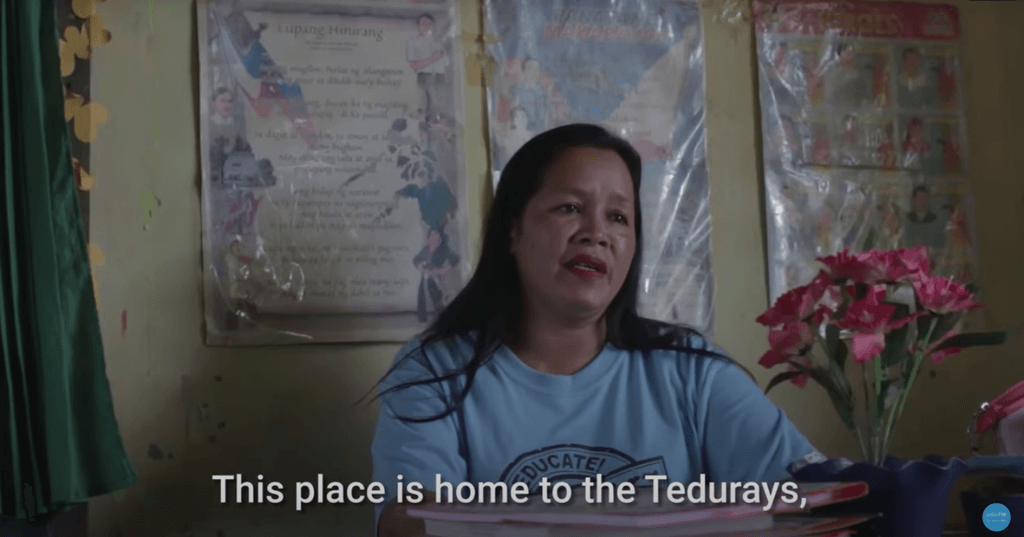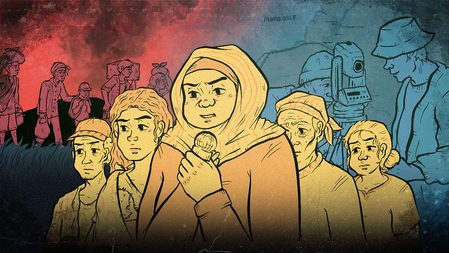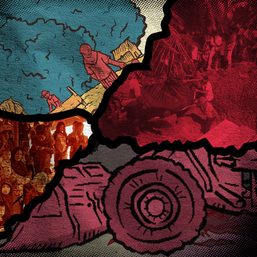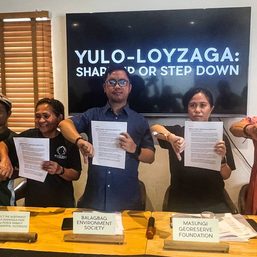SUMMARY
This is AI generated summarization, which may have errors. For context, always refer to the full article.

MANILA, Philippines – They were nervously counting until the year 2022 was over. If they survived the year, they were safe.
But at dusk on December 20, 2022, shortly after leaving her office in Cotabato City, unidentified gunmen shot and killed Jocelyn Samar Palao, an indigenous tribe leader at the forefront of the struggle for land rights in the Bangsamoro.
It was, to Palao’s friends and family, a nightmare come true. One of her co-workers had been dreaming that she would be killed by a riding-in-tandem team, which was exactly what happened.
Palao belonged to the Tedurays, a non-Moro indigenous peoples (IP) group scattered in Mindanao. A teacher for almost two decades, Palao joined the autonomous Bangsamoro government as head of the ancestral domain division of the Bangsamoro Autonomous Region of Muslim Mindanao (BARMM) Ministry of Indigenous Peoples Affairs (MIPA).
Palao was feisty and progressive, known in their tribe for encouraging women to take up stronger and more empowered roles in their families and communities, said people who had worked with her and who spoke with Rappler on condition of anonymity for security reasons.
Palao also served as ex-officio commissioner of the Bangsamoro Women Commission. When Palao was a teacher, she organized IP students, who had lesser access to education out of poverty, so they’d come out of their shell and be more assertive.
One of Palao’s last projects before she was killed was getting justice for the 27 Tedurays who died in multiple landslides in late October 2022 at the foothills of Mt. Minandar in Datu Odin Sinsuat (DOS), Maguindanao del Norte. Severe Tropical Storm Paeng (Nalgae) hit the region back then.
The police have not established motives for her killing. The BARMM Parliament has filed a resolution calling on national law enforcement to investigate and file appropriate complaints.
Ancestral domain issues are always perilous, but stakes in the Bangsamoro are even higher, sources said, because of the complex layers of history, religion, clans, and the region’s problem with violence.
‘Focus on the Tedurays’
Palao, “Ma’am Jo” to everyone she has worked with – from her students to her MIPA team – was a hands-on chief for MIPA’s ancestral domain division. She would personally attend every meeting, and no agenda was too small for her presence. On the day she was killed on December 20, 2022, she had just gone from a “tense” meeting in nearby Ampatuan town for a different ancestral domain issue of IPs there.
As a Teduray herself, Palao was said to have really focused on the issue of the landslides that killed her fellow tribespeople. A Rappler investigation found that after the Tedurays were forced to move to the foot of the mountain where landslides later killed them, resorts were built along the seaside which they used to occupy. One of these resorts is owned by the daughter of a local official belonging to the Sinsuat political dynasty that rules the town of Datu Odin Sinsuat, the investigation showed.

The Tedurays were forced to relocate to the foothills during the Christmas season of 2020. The IPs had been diligent in documenting their displacement and around July 2022, the folder reached Palao’s desk in MIPA.
“Focus on this,” Palao is said to have instructed her team. She said the Tedurays must be empowered and informed enough to do the negotiations themselves, and to make decisions they are truly on board with and can stand firmly by.
But she also told her team to be careful, reminding them to try their best to find “a win-win solution where we don’t create trouble.” She is assertive, but she knows the ways of peace negotiations, said the source who worked with her, “that’s why I cannot fathom that someone would want to kill her,” the source said in Filipino.
When Senator Robin Padilla delivered an impassioned privilege speech at the Senate on November 22, 2022, about the plight of Tedurays, Palao listened intently and waited for someone from Padilla’s team to reach out. She was “excited,” the source said, for a lack of a better term, that there was finally national attention on the issue.
She was excited, but also wary. Her colleagues remember Palao saying that “sa pagkuwento namin sa senador, sa aming pag-uwi, hindi ko alam kung sino sa amin ang puwedeng mawala ang buhay (after talking to the senator, on the way home, I didn’t know who among us could lose his or her life.)
Palao met Padilla in Davao City sometime in December 2022, and accompanied the senator’s staff to “Ground Zero” after that.
Padilla filed a resolution calling for a Senate inquiry into the issue, which would have covered the overarching question of the IPs’ forced relocation, a persisting problem of Filipino tribes whose right to ancestral domain has been threatened by political and business interests like mining and development. To this day, no Senate inquiry has happened.
Padilla told Rappler it was because no member of the Teduray tribe directly affected by the disaster was willing to go to the Senate to speak during the public hearing, and he didn’t want to exert pressure on the IPs to expose themselves. But the Timuay Justice and Governance (TJG), an indigenous political structure of the Teduray and Lambangian, had already flown to Manila on December 11, 2022 ready to speak before the Senate, but was told upon landing that the probe would be postponed.
While the Tedurays’ plight has been remarkably tense for Palao, people who have worked with her have been considering other factors in her killing, and that “maybe [her killers] just rode on this issue” to distract the investigation.
Palao, said the sources, is very “frank” in a line of work that sometimes requires tact and a soft approach. In fighting for ancestral domain, protecting the ego of powerful clans is a needed skill.
“Sa ‘yo na ang karapatan, pero parang ikaw pa ‘yung takot na i-assert mo ang iyong karapatan,” said a source. (You already have the right, but you’re the one who’s afraid to assert that right.)
‘Yes, boss’
IPs, the source said, believe that if you have dreams about something bad happening to a person, that person just has to survive the year and she or he would be safe. Palao, told of others’ dreams about her, admitted getting nervous from time to time.
The day before she was killed, the source said Palao shared that her heart would beat fast, she’d feel cold, and feel odd. On December 20, she got back to Cotabato City after a meeting in Ampatuan town at around 2 pm. She went straight to the MIPA office to take a nap. When she woke up, she even watered the office plants.
Around 4:30 pm, she was still on a call with a colleague who kept reminding her to try to go home before dark. The colleague had one more reminder: leave the office quietly and don’t tell people your whereabouts. “Yes, boss,” she was said to have replied, not because she was speaking to her boss, but because she acknowledged the high security concerns of those around her.
At around 5:30 pm, gunmen tailed her vehicle and shot her.
Palao is survived by her husband and three children.
Palao’s legacy
Palao is the daughter of farmers of sweet potato. She’d take sweet potato to eat in school, and worked part-time to be able to finish her degree. Even as a teacher, she would sell fruits and rice corn.
Palao, who was killed at 52 years old, dedicated almost half her life to teaching. She taught IP children in the Bangsamoro, where hundreds of barangays have no school affecting tens of thousands of children, according to data from Unicef (or the United Nations International Children’s Emergency Fund).
Palao taught in schools where students walk three hours from their homes just to attend class. They walk in the dark through cornfields and rivers to learn.

In an interview with Unicef in 2019, Palao said: “I feel like a second parent, and that it is my duty to educate children of my tribe. I understand their hardship. Their parents are occupied in the fields all day to make a living. They are not able to help their children at home.”
Palao also helped UN Women conduct training for Bangsamoro women, build a training kit for IP women to relearn their roles, and take back their power in terms of labor and leadership in their communities.
When the opportunity came to join BARMM MIPA, Palao took it because, “although it was difficult for her to leave teaching, she had a positive mindset that she can help more people, and have a bigger role in improving the lives of IP communities, especially women.”
Palao helped set up IP cooperatives, “which is now thriving, a legacy she truly left,” the source said. While she was an advocate of preserving customs and traditions, she was vocal about stopping the tradition of young IP women being married off early, or forcibly, to older men. When men joked about marrying young women, Palao would strongly object, and cite the Philippines’ VAWC law or Anti-Violence Against Women and Their Children.
“She is a big loss to the community. She is the type of person that when you tell her a problem, she would find a solution,” the source said.
“She is an assertive woman, very strong, and very strict – she would call you even at night to ask the status of our projects,” the source added.
Despite the high risks, Palao was never one to back out or even delay projects, said a colleague.
Palao did this because, as she would always remind her team: “Bawat galaw natin, bawat salita natin, bitbit natin ang katutubong pamayanan (Every thing we do, every word we say, we represent the indigenous peoples.)
“Buhay ang diwa ni Ma’am Jo, tuloy ang laban,” said the source. (Ma’am Jo’s spirit lives on, the fight continues.) – with reports from Raizza P. Bello/Rappler.com
Add a comment
How does this make you feel?




















![[The Slingshot] Lito Patay’s 4 hours and 38 minutes of infamy](https://www.rappler.com/tachyon/2024/07/Lito-Patay-4-hours-infamy-July-19-2024.jpg?resize=257%2C257&crop=233px%2C0px%2C720px%2C720px)

![[The Slingshot] A Duterte and Bato cop named Patay](https://www.rappler.com/tachyon/2024/06/tl-lito-patay.jpg?resize=257%2C257&crop=322px%2C0px%2C720px%2C720px)








There are no comments yet. Add your comment to start the conversation.